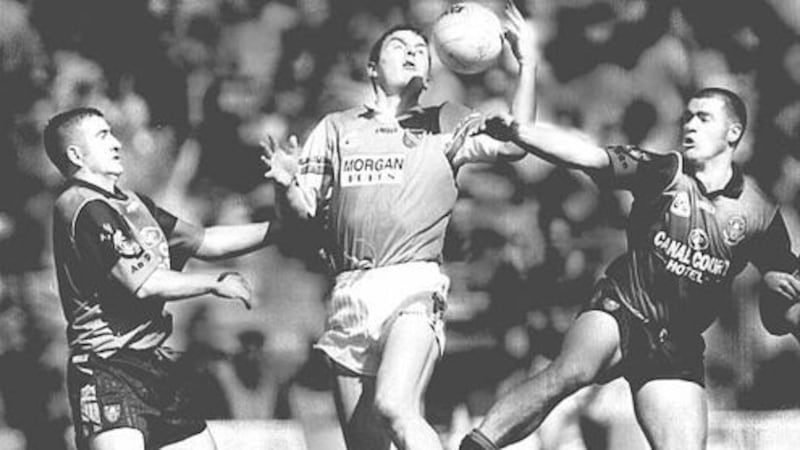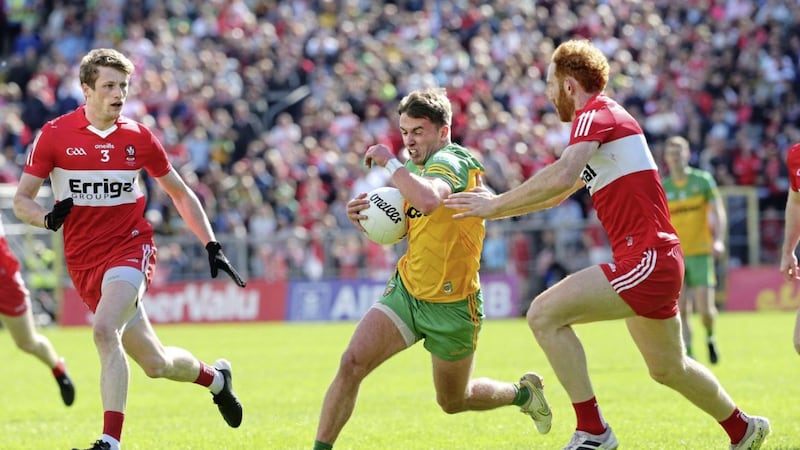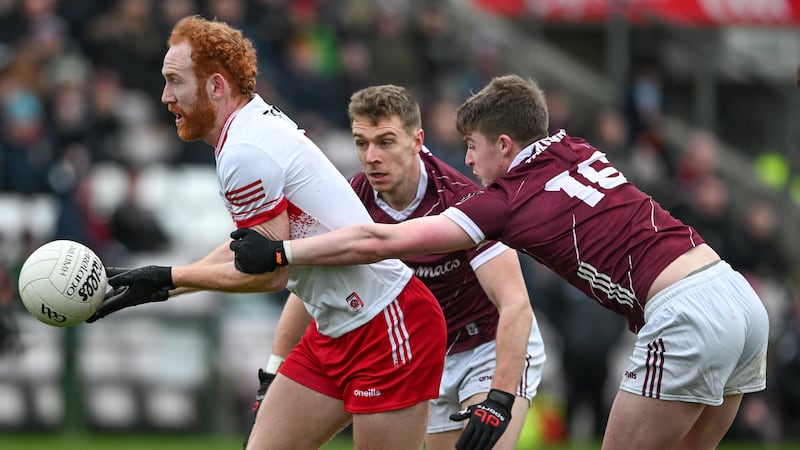WHEN Shane Mulholland met up with his old Abbey CBS team-mate John McEntee in the lead-in to Down’s 1998 Ulster Championship clash with Armagh, he got a look through the window of what was coming.
The Down centre-forward was almost more familiar with the enemy than his own, with the Abbey’s MacRory teams in the early 1990s loaded with the next generation of Orchard stars.
Aidan and Cathal O’Rourke, Enda and Justin McNulty, Tony and John McEntee and Kieran McGeeney had all come through the school, while Oisin McConville played his first five years’ football there as well.
They were all still young men when the counties were paired together in the Championship draw in ’98 for their first meeting in six years.
“There was this thing at the time about Armagh having won nothing and the Down team wasn’t far off the ’94 All-Ireland winning team. A lot of those legends in Down football were still playing,” recalls Mulholland.
“McEntee said to me: ‘I have no problem playing Down, they’ve never beaten me in anything’.
“It was that Crossmaglen philosophy. It just didn’t seem to be an issue for him.
“That mentality was coming in through Armagh. They didn’t have any fear of Down players, Down tradition or history, even their recent successes.”
The shelf life of Pete McGrath’s team was drifting towards its natural end but they still had seven of the 1994 All-Ireland winning team on hand.
And this was Armagh. Even though they’d beaten Down after a replay in 1990, they had won nothing themselves and, barring taking Donegal to a replay in ’93, hadn’t really shaped at success.
But with Ulster minor titles in 1992 (when they lost the All-Ireland final by a point to Meath) and 1994, it was well known that a revival was on its way.
What they needed heading into ’98 was a victory of some significance. Down might have been on the wane but there was still a high level of reverence for them inside and outside the county.
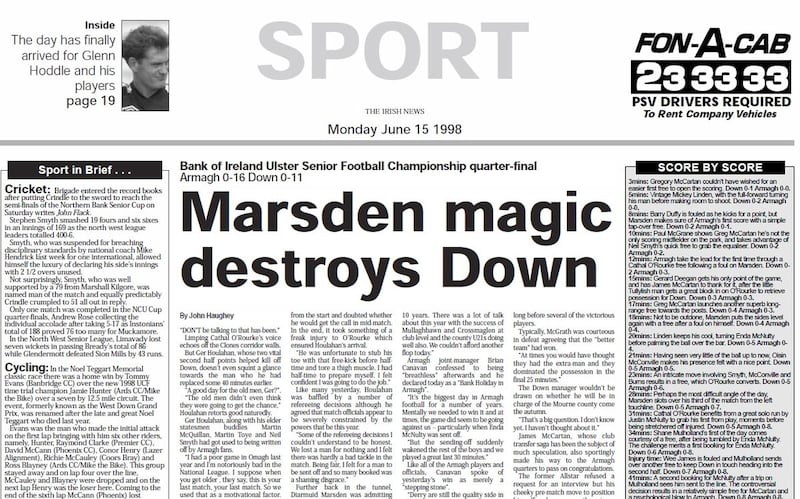
The fact that there was more awe of the double All-Ireland winning generation from their own young team-mates than from the Armagh youngsters going into face them was, for Mulholland, half the problem.
“The Armagh boys drove the thing for them, whereas we kind of jumped into the back seat.
“They were driving that entire squad and demanding more from that squad, and more from their experienced players. We were the other way around – we were looking to the older boys to be leaders.
“We were coming in in awe of that group of players but we should have taken the responsibility on and demanded more from ourselves and that group of players, even though they had their medals.
“I always look at those boys I played MacRory football with and what they achieved, and we didn’t, and I think it was drive and desire.
“There wasn’t any gulf in ability because there was no difference in class. They were driven to win that All-Ireland.”
The fearlessness in Armagh came from their youth.
Goalkeeper Benny Tierney was one of the senior men along with the likes of Jarlath Burns and Neal Smyth and he admits that for the elder statesmen, there was perhaps more of a hang-up on Down than the next generation had.
“We would have been in slight awe as well. Not the younger boys – Tony McEntee and Oisin and those boys brought a bit of an arrogance that Armagh didn’t have.
“It wouldn’t have bothered Tony McEntee if he was marking Mickey Linden. The bigger the battle the better. Other men would maybe have had sleepless nights.
“Maybe that freshness and brashness that those young boys brought in was one of the key factors we went on to do what we did.
“Even if we had a decent side going into the Championship, we didn’t have a reputation for winning and we had no arrogance, if you played Down they were arrogant and had every right to be.
“They had five All-Irelands, a multitude of Ulster medals, a team that might have been ageing but when you walked on to the field and saw wee James and Conor Deegan and boys like that, you still stood back a wee bit in awe of them.
“Tony Mac and McConville and Paddy McKeever and those boys, they feared nobody.”
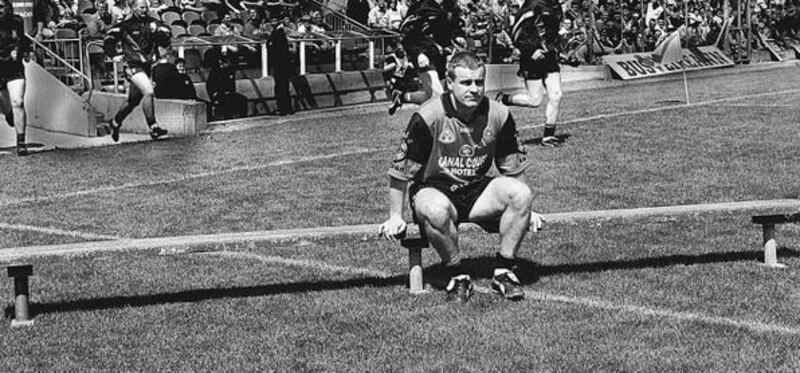
The build-up to a game played in glorious Clones sunshine was dominated by rumours in Down that James McCartan wouldn’t play over his bid to transfer from Tullylish to Burren.
He did play the 70 minutes at wing-forward and Mulholland recalls knowing that would be the case, and Pete McGrath managing the uncertainty in typically astute fashion.
Armagh joint managers Brian Canavan and Brian McAlinden fired a blank during the week too, naming Diarmuid Marsden at wing-half back in their team - but Down didn’t buy that either.
He played at full-forward as expected and this was the afternoon when Marsden really announced himself to the world, kicking seven points as a determined challenge overcame even the loss of free-taker Cathal O’Rourke to injury and Enda McNulty to a second booking early in the second half.
McNulty’s brother Justin turned in a magnificent display against veteran Ross Carr, who had still been man-of-the-match in Down’s quarter-final win over Tyrone.
Shane Mulholland came up against a force of nature in Kieran McGeeney, who ran the show for Armagh that afternoon, and the Ballyholland man says a redeployment of forces in the half-forward line could have made the difference.
“If Ross had played at 11 he wouldn’t have had the same running to do and I could have covered the running.
“McGeeney was their spiritual leader. My game was about running and I thought there was no way he’d stay with me, I’d just have too much legs for him.
“I played a ball down the line early on and went for the return, and he stayed with me, and stayed with me. In that moment I knew he had the legs.
“I remember a ball breaking 60-40 for me in midfield and I went in, and he leant into me. His physical power knocked me to one side and won the break ball, and I thought ‘f***’.
“I think Ross would have gone better against him physically. McGeeney was their leader and Ross might have been our leader, and that battle could have been decisive.”
Still, the Down centre-forward did have one big chance in the game when it was 0-9 to 0-6 midway through the second half.
He drifted to full-forward and sneaked goalside of McEntee as the ball floated over the last man and into his arms, one-on-one with Tierney.
“When we turned, he got his studs caught in the lace of my boot. It wasn’t enough to fall down but it just caught me for a split second. By the time I got my shot off, Tierney made the save. I think if we’d kicked a goal at that time, it could have swung our way,” says Mulholland, who feels it was a game Down left behind.
Armagh would lose in the semi-final to the last Derry team to have won an Ulster title but they had broken down the first major psychological barrier.
Over the next four years, they would tear down all the rest of them to win three Ulster titles and an All-Ireland. In ’99 they would beat Donegal, Derry and Down en route to the provincial crown.
And while history tends to point to their lacing of Down in the ’99 Ulster final as the beginning of a new era, the previous June was the first real step on the road.
“We all saw what came to fruition from that,” says Tierney.
“Armagh announced themselves as contenders, which we hadn’t been in 16 or 17 years. We were there or thereabouts.
“And it’s always nice to get one over on Down. You wouldn’t go into Newry for about two months after they stuffed you, but we were in Newry for about a week after that,” he chuckles as he looks forward to meeting old friends and foes at Pairc Esler on Sunday.
THE TEAMS THAT DAY
Sunday 14 June 1998
Ulster SFC quarter-final: Armagh 0-16 Down 0-11
Armagh: B Tierney; E McNulty, T McEntee, M McNeill; A McCann, K McGeeney, J McNulty; J Burns, P McGrane (0-1); C O’Rourke (0-3), B Duffy, N Smyth; P McKeever (0-1), D Marsden (0-7), O McConville (0-2). Subs: G Houlahan (0-2), M McQuillan, B O’Hagan
Down: M McVeigh; F Caulfield, B Burns, M McMurray; S Poland, C Deegan, M Magill; G McCartan (0-3), S Ward; R Carr (0-1), S Mulholland (0-3), J McCartan (0-1); G Deegan (0-1), M Linden (0-2), S Ward. Subs: P Higgins, C McCabe
Referee: M McBrien (Fermanagh)
